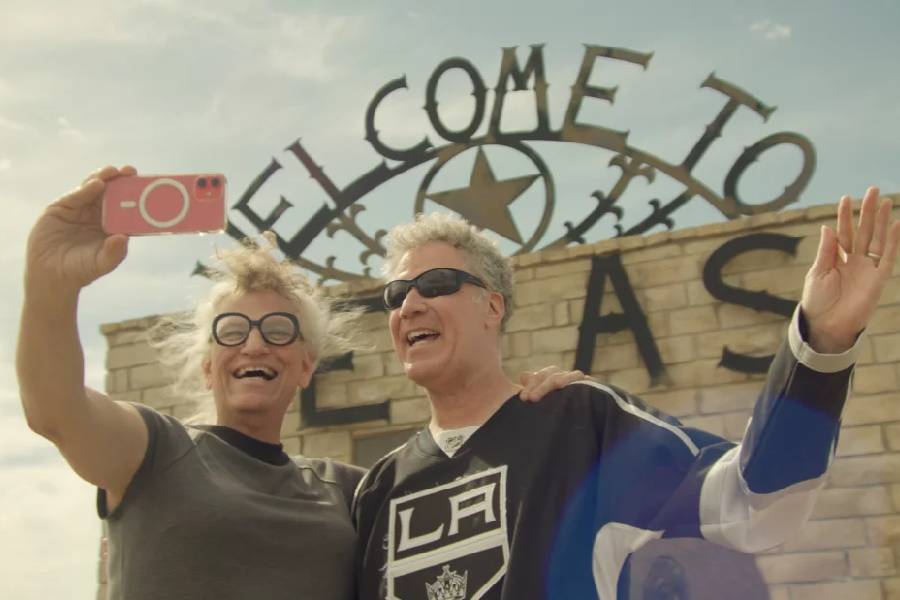5.0 out of 5.0 stars
Netflix’s new documentary, “Will & Harper,” highlights the strength of two life-long friends — Harper Steele and Will Ferrel — who take to the road so Steele can re-experience the country as her true self after coming out as a transgender woman two years ago. This documentary tells Steele’s story beautifully, and doesn’t shy away from difficult conversations. The trip won’t be easily forgettable for the duo or for viewers.
Steele was a writer on Saturday Night Live in 1995 when she met Ferrell, who had aSsslso just been hired as a performer. As Steele advanced to a head writer, she and Ferrell continued to bond and become close friends.
In the documentary, Steele and Ferrel go on a transformative road trip across the U.S. that tests both their ever-growing friendship and Steele’s changing relationship with the country she loves. Steele talks about how she has always loved the hole-in-the-wall type of bar, but since her transition, she hasn’t visited them because of the potentially unsafe atmosphere for her now.
“Will & Harper” is a beautiful illustration of how two good friends can learn from each other. They share a willingness to combat any insecurities or transphobia that Steele faces while experiencing drastically different political atmospheres across the U.S. Steele has conversations about her gender identity with strangers in multiple states throughout the movie, and while the presence of cameras makes their true feelings unclear, some strangers are more receptive than others.
One of their first stops is Washington D.C., where Steele reflects on a past therapist from seven years prior who shut down her feelings about her gender identity. The film expresses Steele’s excitement to finally see the different parts of the country as herself.
While on the road, Steele is understanding of Ferrell’s questions and answers them openly. She and Ferrell share personal conversations on the road trip that are important not just for their friendship, but for the audience of this movie. Ferrell’s compassion and open-mindedness toward Steele call attention to how audience members can also understand and support the transgender community.
“I know there’s no ill intention, so whatever you say I could not possibly be angry,” Steele says to Ferrell in the car in regard to him asking her some personal questions, like if she had considered further physical surgery and how her mental health had been affected over the years.
The two also reflect on moments where Ferrel was ignorant to instances hurtful to Steele. When Ferrell poses for photos with Indiana state governor Eric Holcomb at a basketball game, Ferrell finds out that Holcomb has signed anti-LGBTQ and gender-inclusive bills. He apologizes to Steele later for “dropping the ball” and they talk through the incident.
At another point in the documentary, Ferrell cries in the passenger seat of the car while Steele drives, expressing his feelings of having let her down at a dinner where many cameras were pointed their way and transphobic comments flooded the internet.
The many heart-wrenching moments of vulnerability were easily balanced with the pair’s humorous chemistry, making for a dynamic tone throughout the film.
When Steele and Ferrell call their friend Kristen Wiig, an actress and comedian who has also been on Saturday Night Live, asking her to create a theme song for them, the pair have numerous artistic requests. They ask that it be jazzy, up-tempo and tear-jerking, and that it should have a country twang to match the spirit of their road trip destinations. This scene serves as a comedic bit that is brought up along the road trip as they continue to call their friend. Steele and Ferrell are very comfortable with each other, which is heightened by the end of the movie. It allows the audience to laugh and cry right along with them.
Once the pair reaches Oklahoma, Steele has a revelation about what she is truly afraid of, and ends the day crying in the car. This scene is one of many intense moments throughout the film.
When Steele decides she needs to go into a bar by herself to prove that she can face her fears, the camera pans to show pro-Trump and anti-Biden flags hanging from the walls inside. This scene is extremely nerve-wracking, as the concern for her safety increases. However, she leaves the bar smiling and saying goodbye to her new friends.
“I’m not really afraid of these people, I’m afraid of hating myself,” Steele says while Ferrell begins to cry next to her.
This documentary is a helpful reminder that support can come from friends and family, but also from the least expected of places, like strangers in an Oklahoma bar. The film is just as emotional and intimate as it is funny thanks to Steele and Ferrell’s undeniable comedic genius.





















